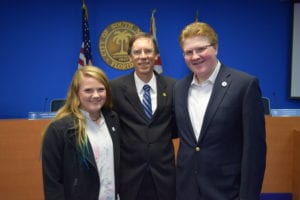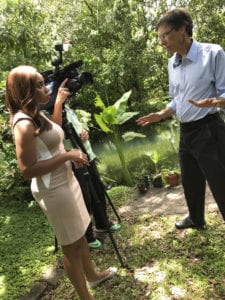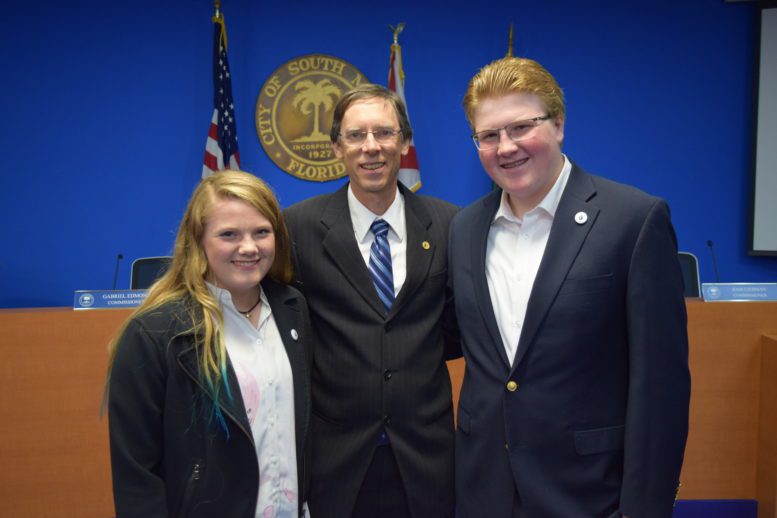
Starting in 2015, Miami-based environmental activist Delaney Reynolds began asking dozens of mayors across South Florida to consider working with her to create a law that would change the way new homes are constructed – and “help change the world for the better.”
Just one mayor answered her call. Mayor Phil Stoddard of South Miami, widely known as an activist in his own right, a proponent of renewable energy, an environmentalist. He quickly responded and immediately set a course whereby he and Reynolds would work side by side for a year to research and write the language that would make up a new “Solar Requirements” section to the city’s Land Development Code.
On July 18, it was mission accomplished, as the city enacted its new residential solar mandate, making South Miami the only municipality between The Golden State of California and The Sunshine State to enact a law mandating that solar power be installed in newly built homes or those subject to major renovation.

Reynolds issued a statement immediately following the vote: “This brave decision by the South Miami City Council is historic and certainly a step in the right direction towards my dream of turning the ‘Sunshine State’ of Florida into ‘THE Solar State’.” Reynolds begins as a freshman this fall studying Marine Biology at the University of Miami.
The legislative process was not without its critics – and some dubious attempts at clouding the facts. In June, just hours prior to one of the city commission’s many hearings on the matter, a misinformation campaign was launched asserted this rule would force all homeowners to install solar-collection systems.
This fake fact and other inflammatory statements shared in robocalls were swiftly debunked by city commissioners. After all, the installation of solar collectors applies only to new homes being constructed and those that are renovated at or above 75 percent of their current value.
A Bold Move
“In actuality, the new requirements will impact only a few homes,” said Reynolds. “But make no mistake, this bold and smart move by city leaders in South Miami is very, very important – and certainly ‘moves the needle’ in the right direction.”
Sponsor of the legislation Mayor Stoddard says it’s a “significant win-win” for residents. “The greater benefit of this rule is, we’ll reduce carbon emissions and maybe our kids and grand kids get to stay in South Florida. And the immediate short-term benefit of having solar on rooftops is, you get power at better-than-utility prices and you get to save money.”
South Miami Commissioner Josh Liebman isn’t so sure. While he says he fully supports solar power, he believes this new rule is “yet another example of the City Commission acting in a counter-intuitive way.
“Now here we are with a rule requiring solar-power systems that could add up to $25,000 to the cost of a new home, yet they say claim to be concerned with affordable housing in South Miami.”
Liebman says it’s a “classic example” of the city commission failing to represent the community. “They are taking away the citizen’s right to choice. This is the very reason people need to get out and vote – the commission is totally out of touch.”
And then there’s former South Miami Mayor Horace Feliu, who spoke out in favor of the ordinance, yet believes the rooftop rule falls short.
“Sadly, the ordinance does not require commercial and high-density apartment or condo buildings to use solar panels,” said Feliu, who worked to create the first Green Task Force several years ago in Miami-Dade County in order to increase efficiency and reduce the city’s carbon footprint. “As many of us know, high-density buildings which are scheduled to be built here in South Miami are the biggest consumers of electricity per square foot.”

Let’s Get Serious
Reynolds sees the bigger picture. “Sadly, Florida ranks 14th in the amount of energy we produce from solar power, but the good news is, we rank third in our potential to generate power from the sun.”
Experts predict that 50 percent of Florida’s energy can be derived from solar power by the year 2045 if the state begins to as Reynolds suggests, “get serious” about this clean, abundant energy source.
“At a time that our state and country should be dramatically increasing its sustainable use such as solar power, these rankings are a bit discouraging, but not surprising,” she continued.
“A reliance on fossil fuels and of old technologies is destroying our planet and established businesses such as Florida Power & Light are all too happy with the way things are,” Reynolds added.
A Family Affair
Delaney’s brother Owen Reynolds, a sophomore at Palmer Trinity and the creator of a solar-car concept called “The Apollo Project,” spent part of his summer advocating for South Miami’s proposed solar panel law, as well.
Like his sister, he’s grown up in a solar-powered home and sees the virtue of solar as he explained before the city commission at a July 11 hearing. “In 1931, Thomas Edison was touting solar and was quoted as saying, ‘I’d put my money on the sun and solar energy. What a source of power!’
“So almost 100 years later,” Owen continued, “it’s time we took one of the world’s greatest inventor’s advice and installed solar power everywhere.”
At every opportunity, Reynolds challenges residents and elected officials to continue working “to help take on the many challenges facing our country as we evolve from a fossil-fuel economy to a sustainable one,” she says.
“But if we are to ever make that transition, I believe the solutions will most certainly begin in our local communities, just as it is here in South Miami.”
While on a recent speaking trip in May in St. Petersburg, Fla., that city commission voted to begin researching and drafting a similar law after Reynolds shared public remarks about the work she did with South Miami. Now, as many as seven other Florida cities are also working on drafting similar rules.

Delaney Reynolds is founder of The Sink or Swim Project, educating and engaging people of all ages about the risks of climate change and sea level rise in hopes that we can work together as a global community to solve this crisis. For information visit www.miamisearise.com. To learn more about Delaney, visit www.delaneyreynolds.com.







It’s too bad you didn’t get a quote from a solar panel installer on how much it might actually cost to install the minimum number of panels the ordinance requires. I think Mr. Liebman’s estimate is exaggerated. I am also so tired of hearing Mr. Liebman criticize his teammates on the Commission as “being out of touch.” There are very few homes that will be affected by this ordinance – especially since many homes in South Miami are well-shaded and would not qualify if they were to be significantly enlarged. So much thought has gone into this ordinance – no requirement if a home which did not have solar panels needs to be rebuilt after a hurricane, the actual structure of the panels and their frame strengthens a roof, etc.
As usual the people responsible for this new ordinance know it will make not one iota of difference in carbon emissions yet they go on to actually say, “maybe this will enable our kids and our grandkids to remain in Florida”. Coming up with a law only imposed on a handful of homes and not new businesses, condos, etc. then patting themselves on the back that they really accomplished something. Boy what a group. See if they spend 25,000 plus putting up panels on their houses. Oh, what happens next hurricane when those blow off.
This was a grandiose waste of time. There is good reason that no other cities wanted to buy into this plan..
BOGUS AND DOES ZERO
Oops, now what.